
The Battle of Culloden took place on 16 April 1746, near Inverness in the Scottish Highlands. A Jacobite army under Charles Edward Stuart was decisively defeated by a British government force commanded by the Duke of Cumberland, thereby ending the Jacobite rising of 1745.
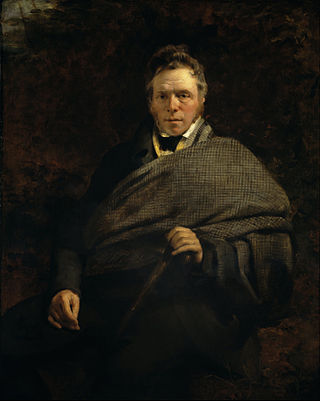
James Hogg was a Scottish poet, novelist and essayist who wrote in both Scots and English. As a young man he worked as a shepherd and farmhand, and was largely self-educated through reading. He was a friend of many of the great writers of his day, including Sir Walter Scott, of whom he later wrote an unauthorised biography. He became widely known as the "Ettrick Shepherd", a nickname under which some of his works were published, and the character name he was given in the widely read series Noctes Ambrosianae, published in Blackwood's Magazine. He is best known today for his novel The Private Memoirs and Confessions of a Justified Sinner. His other works include the long poem The Queen's Wake (1813), his collection of songs Jacobite Relics (1819), and his two novels The Three Perils of Man (1822), and The Three Perils of Woman (1823).

The Battle of Falkirk Muir, or Battle of Falkirk, took place near Falkirk, Scotland, on 17 January 1746 during the Jacobite rising of 1745. A narrow Jacobite victory, it had little impact on the campaign.

The Private Memoirs and Confessions of a Justified Sinner: Written by Himself: With a detail of curious traditionary facts and other evidence by the editor is a novel by the Scottish author James Hogg, published anonymously in 1824.
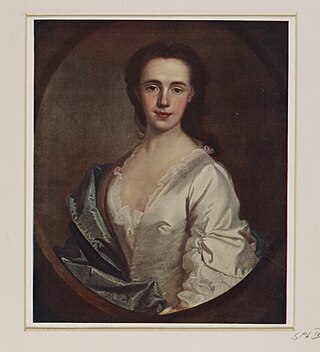
Anne Mackintosh (1723–1787) was a Scottish Jacobite leader, who was the wife of Angus Mackintosh, Chief of the Clan Mackintosh. She was one of very few (apparent) female military leaders during the Jacobite rising of 1745 and the first female to hold the rank of colonel in Scotland.
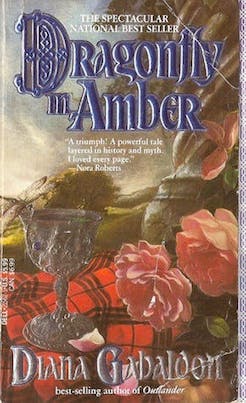
Dragonfly in Amber is the second book in the Outlander series of novels by Diana Gabaldon. Centered on time travelling 20th century nurse Claire Randall and her 18th century Scottish Highlander warrior husband Jamie Fraser, the books contain elements of historical fiction, romance, adventure and fantasy. This installment chronicles Claire and Jamie's efforts to prevent the Jacobite rising that Claire knows will end disastrously for the Scots.
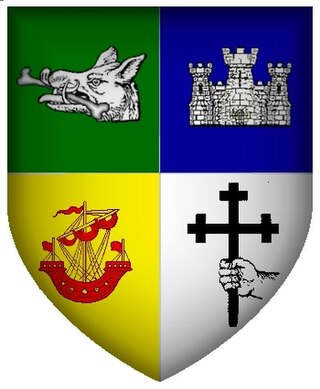
Clan MacKinnon is a Highland Scottish clan from the islands of Mull and Skye, in the Inner Hebrides.
Love and Freindship [sic] is a juvenile story by Jane Austen, dated 1790. While aged 11–18, Austen wrote her tales in three notebooks. These still exist, one in the Bodleian Library and the other two in the British Museum. They contain, among other works, Love and Freindship, written when she was 14, and The History of England, written at 15.
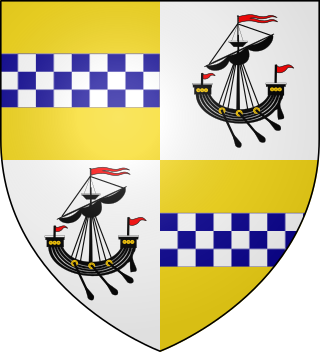
Clan Stewart of Appin is the West Highland branch of the Clan Stewart and have been a distinct clan since their establishment in the 15th century. Their Chiefs are descended from Sir James Stewart of Perston, who was himself the grandson of Alexander Stewart, the fourth High Steward of Scotland. His cousin Walter Stewart, the 6th High Steward, married Marjorie Bruce, the daughter of King Robert the Bruce, and their son Robert II was the first Stewart Monarch. The Stewarts of Appin are cousins to the Royal Stewart Monarchy.

The siege of Inverness took place in February 1746 and was part of the Jacobite rising of 1745.
The Independent Highland Companies were irregular militia raised from the Scottish clans of the Scottish Highlands by order of the Scottish government between 1603 and 1760 in order to help keep the peace and enforce the law in the Highlands and were recognized as such by the government. The officers of the Independent Highland Companies were commissioned as officers of the British Army but the Independent Companies were not recognized as official regiments of the line of the army. The Independent Highland Companies were the progenitors of the Highland Regiments of the British Army that began when ten Independent Highland Companies were embodied to form the Earl of Crawford's Highland Regiment that was numbered the 43rd Regiment of Foot in 1739.
The Queen's Wake is a narrative poem by James Hogg, first published in 1813. It consists of an Introduction, three Nights, and a Conclusion, totalling over five thousand lines, and there are also authorial notes. The poem presents the contributions, in various metres, of a series of Scottish bards to a competition organised by Mary, Queen of Scots on her arrival in Scotland from France in 1561.
The Three Perils of Man; or, War, Women, and Witchcraft. A Border Romance (1822) is a novel by James Hogg set in the Scottish Borders during the reign of Robert II, King of Scots (1371–90).
Mador of the Moor is a narrative poem by James Hogg, first published in 1816. Consisting of an Introduction, five cantos, and a Conclusion, it runs to more than two thousand lines, mostly in the Spenserian stanza. Set in late medieval Scotland, it tells of the seduction of a young maiden by a charismatic minstrel and her journey to Stirling in search of him, leading to the revelation that he is the king and finally to their marriage and the christening of their son.
Winter Evening Tales is a collection by James Hogg of four novellas, a number of short stories and sketches, and three poems, published in two volumes in 1820. Eleven of the items are reprinted, with varying degrees of revision, from Hogg's periodical The Spy (1810‒11).
Queen Hynde (1825) is an epic poem in six cantos by James Hogg. Set in western Scotland in the sixth century, it tells the story of the defeat of an invading Norwegian army by forces loyal to Queen Hynde, advised by Columba, and of the winning of her hand by the legitimate claimant of the throne Eiden. It is mostly in octosyllabic couplets.
A Queer Book (1832) is a collections of 26 poems, mostly short narratives, by James Hogg, all but two of which had been previously published, more than half of them in Blackwood's Edinburgh Magazine.
Altrive Tales (1832) by James Hogg is the only volume to have been published of a projected twelve-volume set with that title bringing together his collected prose fiction. It consists of an updated autobiographical memoir, a new novella, and two reprinted short stories.
Tales of the Wars of Montrose is a set of six fictional narratives by James Hogg published in 1835. Each of them centres on the fortunes of an individual during the civil conflict of the 1640s in Scotland.
The Brownie of Bodsbeck (1818) is the first (short) novel by James Hogg. Set in the Scottish Borders in 1685 it presents a sympathetic picture of the persecuted Covenanters and a harsh view of the Royalists led by Clavers (Claverhouse). It draws extensively on local superstitions.









